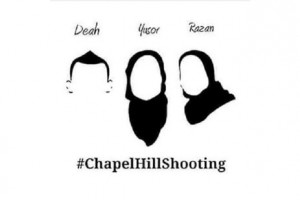 Three Americans were executed near UNC Chapel Hill. And the country’s reaction is, to say the least, muted.
Three Americans were executed near UNC Chapel Hill. And the country’s reaction is, to say the least, muted.
Why?
Because these three Americans happened to be Muslim, and their killer happened to be white. If we reversed the roles, and had a Muslim man murdering three individuals who shared the same religion, there would be intense media scrutiny and nationwide outrage. We would be bombarded with the use of the words, “terrorist,” “fundamentalist,” and “Islamist,” and many in this country — mostly those on the right — would vow revenge on Islam for such a vile act of terror.
But, this time around, it’s not an act of terrorism or a hate crime. No, it’s a dispute over a parking spot. An execution of three Muslims . . . over a parking spot.
The explanation is simply too absurd to bear. And when Muslims and non-Muslims come together to identify this act as what it was — a hate crime or an act of terror — we are told not to do so. We are told not to react too swiftly; not to pass judgment too hastily; not to apply labels too quickly.
It is crystal clear that the American public uses certain words and labels, only in certain contexts. As a bystander, I am trying to wrap my head around these distinctions. It is clear to me now that “terrorism” is defined, in this nation, as an act of violence that can only be conflicted by Muslims. It is also clear to me that a “hate crime” is defined as an act of violence only conflicted on certain select minorities, which have tended not to include black or brown people.
Therefore, brown folks, and more specifically, Muslims, cannot be victims of terrorist acts because they are, by definition, the perpetrators of such attacks. A “hate crime” can never be inflicted on a brown or black person, because these individuals do not fall within the categories of protected minorities.
You might ask — so what? What does the label matter?
It does. It matters a lot.
The language we use to describe certain incidents impacts the consequences of our actions and our responses. Let’s take the Chapel Hill shooting as our tragic example.
This incident has been labeled as a “murder.” A murder is a contained incident. The matter is investigated, charged, and prosecuted by the state. There is a suspect or suspects that committed the acts. There are defined victims. And that is the universe of such an act. It is a self-contained universe, with limited repercussions on society, other than a general societal admonishment of murder, which, of course, already exists.
On the other hand, were the Chapel Hill shooting to be labeled an act of terrorism or, at the least, a hate crime, it would not be a contained incident. The matter would be investigated, charged, and prosecuted on a federal law. The suspect that committed the act would be characterized as part of a larger societal dilemma. The charges would include violations of federal law. The incident would not be contained within a closed universe. Instead, it would spark a nationwide discussion about these sorts of incidents, about protecting Muslims and other minorities, and about fighting back against a larger problem.
In other words, when you apply these labels, our societal institutions react differently; the perpetrator is charged differently; the incident is investigated differently; and the public thinks differently.
Labels create a very real difference. And, to date, by not applying the correct labels to this tragedy, we fail to give it the weight and attention it deserves.
* * *
Yusuf Ziddy is a Canadian born individual of Indian and Yemeni heritage with East African parents currently living in California. In other words, he is a self-sustaining melting pot. He is also a Muslim who cares deeply about issues regarding Islamophobia and the perception of Muslims in the west. As a father of two young children, he is deeply concerned that they will grow up in a country that despises them, for no other reason besides their religion, and he wants to do everything he can to prevent that. He is also an attorney deeply committed to the principles of the American justice system, and strives to make sure those principles of justice work in favor of all.
The post The Chapel Hill Shooting & The Importance Of Labels appeared first on The Aerogram.